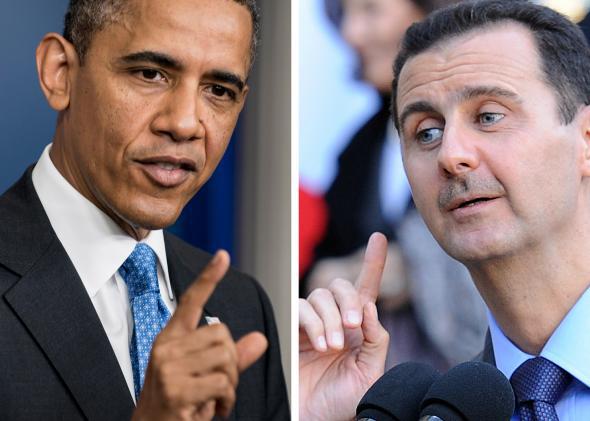In any civil war between a government and armed rebels, the government—for obvious reasons—starts with a number of tactical and material advantages. So it’s not surprising that, at least in most circumstances, when an outside power intervenes on behalf of the state, the state tends to be able to crush the opposition pretty quickly.
Of course, the U.S. and its allies deny that they are intervening on behalf of the Syrian government, the argument being that defeating ISIS—Bashar al-Assad’s foe—while supporting the country’s “moderate” opposition will give those moderates a fighting chance against Assad’s forces.
But according to several articles this week, those moderates are not convinced. The New York Times reports that signs have been spotted at opposition rallies in Syria that read, “America became the arm of Bashar the terrorist.” A commander in the U.S.-backed Free Syrian Army tells the Los Angeles Times, “The coalition is against the blessed Syrian revolution, using the excuse of Daesh,” using the local nickname for ISIS. Other rebel fighters complain to Reuters that they’ve been kept in the dark about anti-ISIS airstrikes. According to some in the Free Syrian Army, the Daily Beast reports, this lack of coordination may have nearly led to the U.S. bombing one of the FSA’s own facilities.
The perception that the U.S. is acting as Assad’s air force is also bolstered by the country’s foreign minister telling the American media that the airstrikes are “OK” and that “as long as they are aiming at ISIS locations in Syria and in Iraq, we are satisfied.”
The rebel movement was fractured long before the airstrikes began, but things only seem to be getting worse. Last week, 13 rebel groups defected from the Western-backed Syrian National Coalition, saying it no longer represented their interests.
The United States’ priority here is obviously not Syria—this intervention would have started years ago if it were. Rather, it’s rolling back ISIS’s gains in Iraq. The mission in Syria is ancillary to that goal. If progress is made in Iraq, the ongoing carnage in Syria will return to the backburner in Washington.
The rebels likely understand this. And despite promised increases in aid from the U.S., Europe, and the Gulf, they seem to realize that a battlefield in which ISIS and Jabhat al-Nusra are severely weakened is likely to benefit Assad more than it does them. They also know that if the U.S. were really serious about helping them against the Syrian military, it wouldn’t be strenuously avoiding striking the Syrian military.
On one level, the Obama administration might not care about this all that much. The priority is weakening ISIS and the al-Qaida-linked al-Nusra at least to the point where the threat they pose becomes relatively manageable again. But if frustration over the airstrikes leads a significant number of rebels to abandon Western-backed “moderate” groups, either for ISIS or another group with explicitly anti-American aims, the U.S. might wind up with a much bigger problem on its hands.
